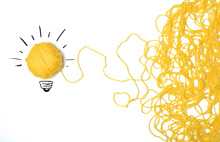These TED Talks highlight promising and inspiring concepts
 Every educator needs some inspiration now and then, and these days, such inspiration can be found online in just a few seconds.
Every educator needs some inspiration now and then, and these days, such inspiration can be found online in just a few seconds.
The internet brings inspiring and motivational speakers and experts to anyone with a connection and an internet-ready device.
TED Talks are some of today’s most popular examples of the internet’s power to expand learning opportunities to all.
Each month, we’ll bring you a handful of inspiring TED Talks. Some will focus specifically on education; others will highlight innovative practices that have long-lasting impact. But all will inspire and motivate educators and students alike.
This month’s talks focus on fostering creativity. Some talks relate directly to education, and others serve to inspire educators and students with stories or examples about creativity and “smart failure.”
Did you miss our most recent TED Talks features? You can find them here.
(Next page: 8 TED Talks about creativity)
1. How art, technology and design inform creative leaders
John Maeda, former President of the Rhode Island School of Design, delivers a funny and charming talk that spans a lifetime of work in art, design and technology, concluding with a picture of creative leadership in the future. Watch for demos of Maeda’s earliest work — and even a computer made of people.
2. How simple ideas lead to scientific discoveries
Adam Savage walks through two spectacular examples of profound scientific discoveries that came from simple, creative methods anyone could have followed — Eratosthenes’ calculation of the Earth’s circumference around 200 BC and Hippolyte Fizeau’s measurement of the speed of light in 1849.
3. Be an opportunity maker
We all want to use our talents to create something meaningful with our lives. But how to get started? (And … what if you’re shy?) Writer Kare Anderson shares her own story of chronic shyness, and how she opened up her world by helping other people use their own talents and passions.
4. What fear can teach us
Imagine you’re a shipwrecked sailor adrift in the enormous Pacific. You can choose one of three directions and save yourself and your shipmates — but each choice comes with a fearful consequence too. How do you choose? In telling the story of the whaleship Essex, novelist Karen Thompson Walker shows how fear propels imagination, as it forces us to imagine the possible futures and how to cope with them.
5. Smart failure for a fast-changing world
The world is changing much more rapidly than most people realize, says business educator Eddie Obeng — and creative output cannot keep up. In this spirited talk, he highlights three important changes we should understand for better productivity, and calls for a stronger culture of “smart failure.”
6. How to build your creative confidence
Is your school or workplace divided into “creatives” versus practical people? Yet surely, David Kelley suggests, creativity is not the domain of only a chosen few. Telling stories from his legendary design career and his own life, he offers ways to build the confidence to create… (From The Design Studio session at TED2012, guest-curated by Chee Pearlman and David Rockwell.)
7. Why work doesn’t happen at work
Jason Fried has a radical theory of working: that the office isn’t a good place to do it. In his talk, he lays out the main problems (call them the M&Ms) and offers three suggestions to make work work. (Filmed at TEDxMidWest.)
8. JK Rowling: The fringe benefits of failure
At her Harvard commencement speech, “Harry Potter” author JK Rowling offers some powerful, heartening advice to dreamers and overachievers, including one hard-won lesson that she deems “worth more than any qualification I ever earned.”
- Friday 5: Virtual field trips - April 26, 2024
- Google, MIT RAISE launch no-cost AI training course for teachers - April 26, 2024
- 4 ways to support work-based learning - April 23, 2024
